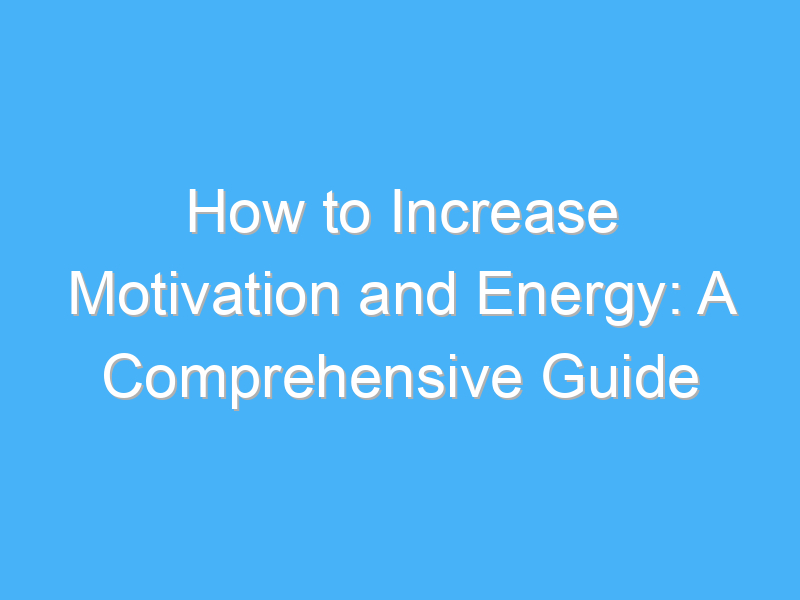
How to Increase Motivation and Energy: A Comprehensive Guide
Feeling unmotivated and low on energy can be a common experience, whether it’s due to stress from work or personal life, lack of sleep, diet, or many other reasons. But there are various practical ways that you can try to boost your motivation and energy levels in both the short and long term. By making a few adjustments to your routine, environment, and mindset, you can help yourself feel more energized, focused, and driven to achieve your goals. In this article, we will explore some tips and strategies to help you increase your motivation and energy.
Understanding Motivation and Energy
Motivation and energy are essential factors that drive us towards success and fulfilment. However, we all have experienced moments of low energy and motivation, which can prevent us from achieving our goals. Understanding the root cause of this issue is crucial to finding the right solution.
The Science behind Motivation and Energy
Motivation and energy are closely linked to the brain’s reward system, which is responsible for creating positive feelings associated with certain activities. Dopamine, a neurotransmitter, is released in the brain when we accomplish something we perceive as rewarding. This release of dopamine creates a sense of pleasure, which motivates us to continue performing the activity.
The Importance of Balance
The key to maintaining high levels of motivation and energy is finding the right balance between work and rest. Overworking ourselves can lead to burnout, while too much rest can lead to laziness and lack of motivation. Finding the right balance can be challenging, but it is essential to achieve optimal levels of motivation and energy.
Tips for Increasing Motivation and Energy
There are several strategies that you can use to increase your motivation and energy levels. Here are some effective tips.
Set Realistic Goals
Setting realistic goals is essential to maintaining high levels of motivation. Unrealistic goals can lead to disappointment and a lack of motivation. Start by setting small achievable goals, and gradually increase the difficulty level as you progress.
Find Your Passion
Passion is a powerful motivator that can drive us towards success. Finding something that you are passionate about can give you a sense of purpose and fulfilment. Identify your interests and hobbies, and try to incorporate them into your daily routine.
Exercise Regularly
Exercise is a great way to boost energy levels and improve overall health. Regular exercise releases endorphins, which are natural mood boosters. It also improves blood flow to the brain, which can enhance cognitive function and mental clarity.
Get Enough Sleep
Getting enough sleep is crucial to maintaining high levels of energy. Lack of sleep can lead to fatigue, which can affect motivation levels. Aim to get at least 7-8 hours of sleep each night to ensure that you are well-rested and energized.
Practice Mindfulness
Mindfulness meditation is an effective way to reduce stress and increase focus. It involves focusing on the present moment and letting go of distractions. Practicing mindfulness can help you stay calm and focused, which can boost motivation and energy levels.
Avoiding Common Pitfalls
There are several common pitfalls that can hinder motivation and energy levels. Here are some things to avoid.
Procrastination
Procrastination is a common problem that can lead to a lack of motivation. It is important to identify the root cause of procrastination and find ways to overcome it. One effective strategy is to break tasks into smaller, more manageable pieces.
Negative Thinking
Negative thinking can be a significant barrier to motivation and energy levels. It is essential to identify negative thought patterns and replace them with positive ones. Practice positive self-talk and gratitude to stay motivated and focused.
Multitasking
Multitasking can lead to a lack of focus and reduced productivity. It is important to prioritize tasks and focus on one thing at a time. This approach can help you stay motivated and energized.
FAQs for How Can I Increase My Motivation and Energy?
What are some strategies to increase motivation?
One way to increase motivation is to set clear, specific goals. This gives you something to work towards and helps you visualize success. Another strategy is to break larger goals into smaller, manageable steps to increase your sense of progress and accomplishment. Additionally, finding a source of accountability, such as a friend or coach, can help keep you motivated and on track.
How can I boost my energy levels?
Increasing energy levels often involves developing healthy lifestyle habits. This includes getting regular exercise, eating a balanced and nutritious diet, staying hydrated, and getting plenty of restful sleep. Additionally, reducing stress and finding ways to relax, whether through meditation or other mindfulness practices, can help improve overall energy levels and increase your sense of wellbeing.
What are some common obstacles to motivation and energy?
There can be many factors that inhibit motivation and energy. For some, it might be a lack of direction or purpose, while for others, it might be feeling overwhelmed or stuck in negative patterns of thinking. Additionally, lifestyle factors such as poor sleep habits, unhealthy diets or lack of exercise can all contribute to low motivation and energy levels. Identifying the specific barriers you face can help you develop customized strategies for overcoming them.
Should I consider other treatments, such as medication or therapy, to increase my motivation and energy?
Depending on your individual circumstances, you might benefit from seeking additional treatments to address low motivation and energy levels. This might include working with a therapist to develop coping strategies or practicing mindfulness techniques to manage stress. In some cases, medication might be prescribed to address underlying health conditions such as depression or anxiety, which can impact motivation and energy levels. If you are considering these options, it is important to consult with a healthcare professional to determine the right course of treatment for you.
